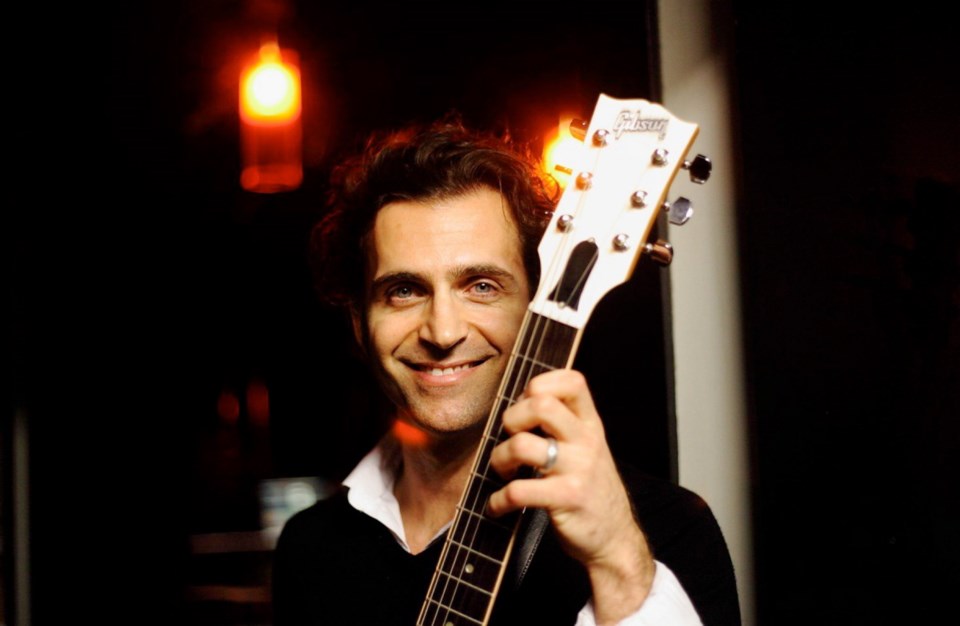What: Zappa Plays Zappa
Where: Club 9one9
When: Tuesday, doors 6 p.m.
Tickets: $32 advance ($65 VIP) Ditch Records, Strathcona Hotel, Lyle’s Place
When Zappa Plays Zappa comes to Victoria, the bandleader hopes to put “eyebrows” on it. This is a Frank Zappa expression, said guitarist Dweezil Zappa. Putting eyebrows on music means the difference between a good performance and “absolutely astonishing expert” playing.
Simply put, it’s a higher level of artistry.
“That little extra bit in there is the ‘eyebrows,’ ” Dweezil said recently from his Los Angeles home. “That’s what makes it special and unique.”
Zappa Plays Zappa is Dweezil’s tribute band, bringing his late father’s music to both old fans and new generations of listeners. The players are necessarily tight-flight — Zappa’s adventuresome, often avant-garde music is notoriously difficult to play.
For this tour, Zappa Plays Zappa will perform, in its entirety, one of Frank Zappa’s most popular albums, Roxy & Elsewhere. The 1974 double-live LP is stuffed with challenging instrumentals such as Echidna’s Arf (Of You), Don’t You Ever Wash That Thing and Be-Bop Tango (of the Old Jazzmen’s Church).
Playing any of this music — with its virtuoso melodies and stuttering rhythms — isn’t for the faint of heart. Dweezil said the most difficult piece is Be-Bop Tango. At the same time, it’s a fun composition. Dweezil routinely asks a couple from the audience on stage to do a be-bop dance.
“You’re basically supposed to ignore the bass and the drums and you dance to the scattered fragments of rhythm. It makes it look like you’ve having an epileptic seizure, basically,” he said.
Roxy & Elsewhere is considered one of his father’s more accessible albums, with deep roots in R&B and funk, Dweezil said.
“The majority of it is very groovy. And that’s what makes it a fun record to play live, because it just has a good feel.”
Listening to Dweezil talk admiringly about his father’s music (in conversation he refers to him as “Frank”) is like listening to Mozart’s son rhapsodize about his dad. Frank Zappa, who died at 52 in 1993, is unquestionably a towering figure in 20th-century popular music. His music was influenced by rock, jazz and serious composers such as Edgard Varèse and Anton Webern. His lyrics were satirical and often bizarre. His album titles give a flavour of his sensibility: Weasels Ripped My Flesh, Hot Rats, Uncle Meat, Burnt Weeny Sandwich.
Dweezil, 44, started performing with Zappa Plays Zappa in 2006. To even entertain the prospect of playing his father’s music, he had to put himself through a self-imposed musical boot camp. He learned songs such as Billy the Mountain, which is 30 minutes long and includes 3,000 words of dialogue. The Black Page is even more difficult, with horrendously (at least for a musician) dense and complex polyrhythms.
To play such pieces, Dweezil had to reinvent his approach to playing the guitar, both physically and mentally.
“It took a long time to become natural to play that way. There are some very hard things I’ve learned to play,” he said.
He also mentioned Strictly Genteel (The Finale), a rock/orchestral freak-out from Zappa’s 200 Motels soundtrack album.
“There were parts that were written for piccolo, flute and some other things that I learned on guitar. Those things were just really, really hard. They weren’t meant to be played on guitar at all,” said Dweezil, who charts and arranges the music.
While he’s earned respect by playing Zappa’s music, Dweezil doesn’t put himself on the same platform as his father, whom he regards as a genius.
“One of the main differences [between us] is the music that we’re playing is music that was swimming around in his head. He created this stuff. … It’s one thing to learn to play the music. And it’s another thing to have created it,” Dweezil said.
“He had a quote, ‘Progress is not possible without deviation from the norm.’ His music is definitely not normal. As far as I am concerned, his music is from the future. So it’s still very progressive.”



